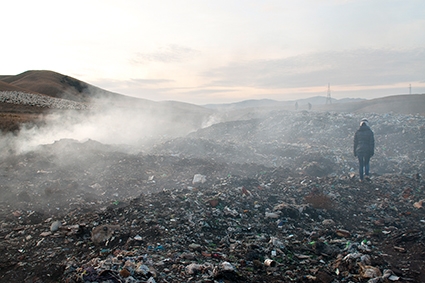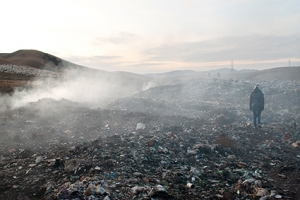Waste Management Project Launches to Reduce Green House Gases
The Georgian government and the EU launched a pilot green waste separation, collection and recycling project in Marneuli in eastern Georgia on March 15.
The launch event was attended by the Ambassador of the European Union to Georgia Carl Hartzell and the Deputy Minister of Environmental Protection and Agriculture Khati Tsilosani along with government representatives and the Major of Marneuli.
The project aims to improve green waste collection in the region by assisting the Marneuli composting plant. 30 containers with a 1,100-liter capacity will be purchased and place in various areas in Marneuli. 120 bins with a 12-liter capacity will also be distributed among local residents for kitchen waste collection.
The project’s goal is to utilize the green waste, that currently ends in landfills, as compost. As around 50% of landfill in Georgia is green waste, the project should cut greenhouse gas emissions significantly.
The pilot initiative comes under the EU-funded “Technical assistance for the improvement of waste management systems in Georgia,” a joint project of the EU, the Ministry of Environmental Protection and Agriculture, the Marneuli Composting Plant and local government.
Speaking at the launch event, Carl Hartzell underlined the importance of waste management in Georgia: “The EU is a global leader in environmental and health issues. Waste management is a key part of this, and we are happy to share our experiences in Georgia,” he said.
“Through this pilot action supported by the EU in Marneuli, we are showing that there are opportunities to better manage waste in Georgia and that green waste can be recycled to produce useful compost,” he continued.
The EU chose to tackle green waste due to its high volume in landfill. This is especially problematic for the environment as organic waste generates methane as it decomposes which is a greenhouse gas 25 times more potent than carbon monoxide. In addition, green waste can easily be recycled to create biological fertilizer and soil conditioning products.
A report by the EU in 2018 found that approximately 900,000 tons of waste are generated annually in Georgia, of which more than 75% goes into landfills. This figure is much higher compared to other European countries such as Germany, the Netherlands, Austria and elsewhere, where over 50% of waste is recycled.
Landfill is the least desirable waste disposal method. In Georgia, only 5 of the 56 official landfills have environmental impact permits. Many landfills were established from the 1960s to 1980s when little regard was paid to the environment and few protective measures were put in place. Landfills therefore create an especially high amount of dangerous chemical substances and harmful pollution.
Merneuli houses the only green waste recycling facility in Georgia. By supporting the project, the EU hopes that the village can “serve as a good example for replication in other municipalities and regions.” If the project is successful, similar recycling projects may be launched in Georgia to reduce landfill waste disposal and environmental damage.
By Amy Jones
Aghluja landfill near Rustavi. Source: EU Neighbours












